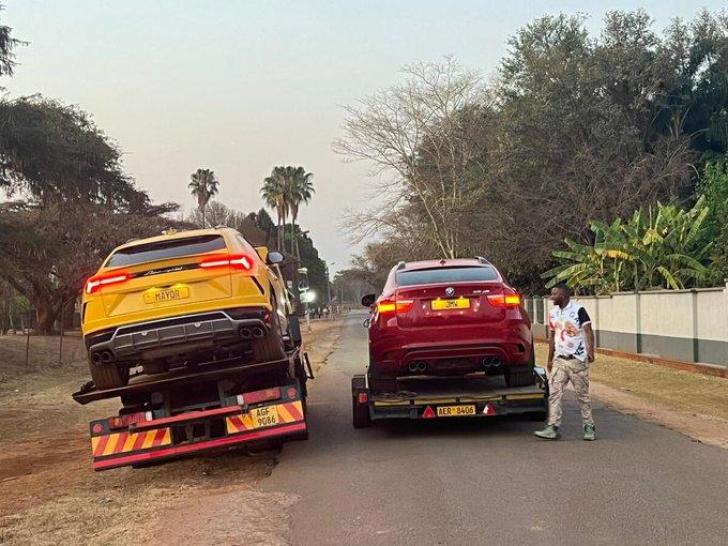News / National
Wadyajena has the last laugh
15 Oct 2024 at 07:39hrs |
0 Views

In a significant legal setback for the National Prosecuting Authority (NPA) and the Zimbabwe Anti-Corruption Commission (ZACC), the Supreme Court has upheld a lower court ruling directing the release of former Gokwe Nembudziya lawmaker Mayor Wadyajena's fleet of vehicles, which includes 25 trucks and a Lamborghini.
The NPA had appealed against the High Court's decision that ordered ZACC to return the seized vehicles, which were confiscated during Wadyajena's criminal trial on charges of acquiring them through proceeds of crime. However, following a review of the case, the Supreme Court dismissed the appeal on Monday.
The bench, comprising Justices Antonio Guvava, Nicholas Mathonsi, and Alphas Chitakunye, ruled that the NPA had no grounds to challenge the lower court's decision. "The Supreme Court ruled that the NPA and ZACC did not have the mandate to retain the property, as the High Court's judgment clearly stated they had 30 days to keep the property but exceeded that period by two years," the justices noted.
Wadyajena's lawyer, Oliver Marwa, expressed satisfaction with the ruling, emphasizing that there had been no progress in the prosecution's case over the past three years. "Our clients have always maintained their innocence, asserting that the properties were legitimately acquired. If ZACC had any evidence, they would have found it by now," Marwa stated in an interview.
Wadyajena, who was arrested alongside executives from the Cotton Company of Zimbabwe (Cottco), faced allegations of fraud amounting to US$5.8 million. It was alleged that he used funds from Cottco, which were purportedly sent to a U.S. firm for the purchase of bale ties for ginning worth over US$1 million, to acquire the 25 trucks.
Alongside Wadyajena, co-accused included Pious Manamike, Maxmore Njanji, Fortunate Molai, Mayor Logistics, and Pierpont Moncroix, all facing charges of fraud and money laundering related to the cumulative sum of US$5,834,000.
This latest ruling adds to the growing concerns about the efficacy of anti-corruption efforts in Zimbabwe, as the NPA and ZACC face scrutiny over their handling of high-profile cases and the prolonged nature of investigations.
The NPA had appealed against the High Court's decision that ordered ZACC to return the seized vehicles, which were confiscated during Wadyajena's criminal trial on charges of acquiring them through proceeds of crime. However, following a review of the case, the Supreme Court dismissed the appeal on Monday.
The bench, comprising Justices Antonio Guvava, Nicholas Mathonsi, and Alphas Chitakunye, ruled that the NPA had no grounds to challenge the lower court's decision. "The Supreme Court ruled that the NPA and ZACC did not have the mandate to retain the property, as the High Court's judgment clearly stated they had 30 days to keep the property but exceeded that period by two years," the justices noted.
Wadyajena's lawyer, Oliver Marwa, expressed satisfaction with the ruling, emphasizing that there had been no progress in the prosecution's case over the past three years. "Our clients have always maintained their innocence, asserting that the properties were legitimately acquired. If ZACC had any evidence, they would have found it by now," Marwa stated in an interview.
Wadyajena, who was arrested alongside executives from the Cotton Company of Zimbabwe (Cottco), faced allegations of fraud amounting to US$5.8 million. It was alleged that he used funds from Cottco, which were purportedly sent to a U.S. firm for the purchase of bale ties for ginning worth over US$1 million, to acquire the 25 trucks.
Alongside Wadyajena, co-accused included Pious Manamike, Maxmore Njanji, Fortunate Molai, Mayor Logistics, and Pierpont Moncroix, all facing charges of fraud and money laundering related to the cumulative sum of US$5,834,000.
This latest ruling adds to the growing concerns about the efficacy of anti-corruption efforts in Zimbabwe, as the NPA and ZACC face scrutiny over their handling of high-profile cases and the prolonged nature of investigations.
Source - NewZimbabwe
Join the discussion
Loading comments…






















